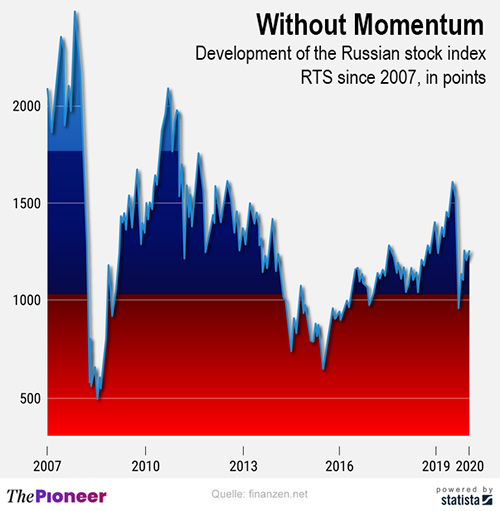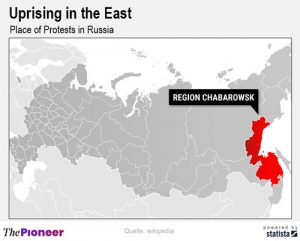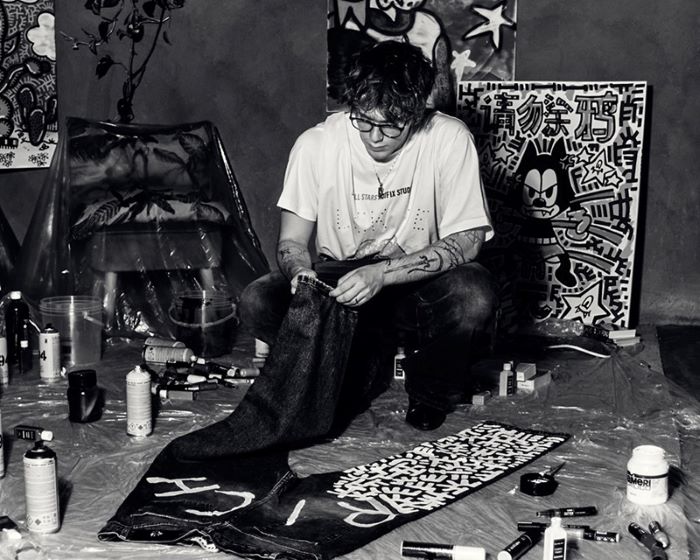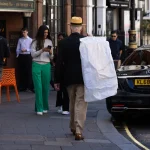The End of the Putin Era Casts It Shadows

The country’s economic power has developed unfavourably. Since the Russian annexation of Crimea in 2014 and the sanctions of the EU and the USA – with the exception of 2018 – annual economic growth has remained below two percent. In the second quarter of 2020, the country’s GDP even fell by up to ten percent. The state goal that Russia should be one of the five largest economies by 2030 has long been history. The president’s omnipotence fantasies are not supported by the economic situation.
Poverty in the country has increased significantly. Almost half of all Russians no longer have any savings due to the corona crisis; 44.6% of the 145 million inhabitants now have to make do with less than the equivalent of €180 per month. Before April this was only 14%.
The dependence of the natural resources trend remains high, and is rising. The share of raw material extraction in the country’s industrial production increased from 34% to 39% between 2010 and 2018, while the share of the manufacturing industry fell from 53% to 51%. The Putin plan of a modern, industrial society is not working.
 The approval ratings for the President, which according to the independent Lewada Institute were 89% at their best, have expired. Only 60% of the Russians support him, today.
The approval ratings for the President, which according to the independent Lewada Institute were 89% at their best, have expired. Only 60% of the Russians support him, today.
In this explosive situation, the demonstrations that have been going on for weeks in the eastern Russian city of Khabarovsk , 6000 kilometers from Moscow and just a stone’s throw from China, look like a lighthouse in the dark. Putin had a popular governor, Sergei Furgal, jailed there and replaced by a follower of the Kremlin.
 [Furgal is accused of being involved in a series of murders 15 years ago, but has denied the allegations. He also belongs to the opposition LDPR party, led by ultraconservative populist Vladimir Zhirinovsky, and won the governor’s election two years ago with nearly 70% of the vote, defeating the Kremlin-backed candidate. He is credited with having solved “lots of problems” that had accumulated since the fall of the Soviet Union. Source.]
[Furgal is accused of being involved in a series of murders 15 years ago, but has denied the allegations. He also belongs to the opposition LDPR party, led by ultraconservative populist Vladimir Zhirinovsky, and won the governor’s election two years ago with nearly 70% of the vote, defeating the Kremlin-backed candidate. He is credited with having solved “lots of problems” that had accumulated since the fall of the Soviet Union. Source.]
Udo Lielischkies, the long-time director of the ARD office in Moscow and the successful author of Im Schatten des Kreml: Unterwegs in Putins Russland (“In the shadow of the Kremlin – Out and about in Putin’s Russia“) delivered a few observations:
“Putin has lost the aura of a powerful man. He was almost completely submerged and had the governors manage this pandemic.”
“Putin has a problem of legitimacy, that’s obvious, and the nervousness in the Kremlin is great.”
“What made Putin so popular a few years ago, for example the annexation of Crimea, has worn out. It doesn’t work anymore. People are now realizing that all this patriotism is not filling anyone. ”
“Just as Putin has been able to book everything beautiful and successful on his account over the past 20 years, everything bad is now credited to him. That is, if you want to say it cynically, an autocratic fate.”
Eight million people are unemployed, there are no jobs and no state aid. But the deal was always: you live poorly, but the state is there to deliver the most important thing. But the state doesn’t do that anymore, either.”
Conclusion: The German public looks towards Washington and Brussels. Meanwhile, the tectonic plates have started to shift in the geographically largest country on earth. When Putin leaves, he won’t go quietly.
 Gabor Steingart
Gabor Steingart
Gabor is“captain” of Germany’s first editorial ship: the “Pioneer One”.
Germany’s Federal President’s Office, Federal Chancellery and Parliament are connected by water so, why take a car when you can float your fully-staffed, 40 meter long news boat with a built-in stage?

The project manager for the editorial ship is American born Chelsea Spieker.
Newsgate NY thanks them for their valuable contributions.






